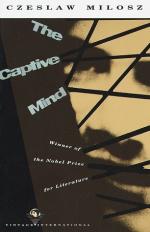
|
| Name: _________________________ | Period: ___________________ |
This test consists of 5 short answer questions, 10 short essay questions, and 1 (of 3) essay topics.
Short Answer Questions
1. In Witkiewicz's novel, the characters ultimately become:
2. According to Witkiewicz, what role does religion play in modern society?
3. The purpose of Chapter 2 is to compare and contrast what two groups?
4. Milosz compares the American law system to what image?
5. Aesthetic Ketman spreads because the citizens crave what aspect of daily life?
Short Essay Questions
1. What is historic fatalism and how does it affect even a man's most personal interactions?
2. Is Ketman necessary to the citizen of the New Faith? Why?
3. How does Ketman create pride in the man who practices it?
4. Although only a couple presses were kept intact, in order to print Nazi propaganda, the underground writing flourished. Why?
5. Why is the Ketman of revolutionary purity the most rare form of Ketman?
6. What advantages does the Center gain with the idea of "cosmopolitanism"?
7. Although human interaction is often characterized by some degree of acting, how do Eastern communists take this to an extreme? How does this affect them?
8. What is the difference between Eastern and Western Communists?
9. .How did Alpha become a more religious writer when he turned away from Christianity?
10. Why, according to party policy, can there be no contradictions in the minds of Soviet citizens?
Essay Topics
Write an essay for ONE of the following topics:
Essay Topic 1
Several people in The Captive Mind believe that life without religion, philosophy, and art is not worth living. Is this true? Are there necessary things which this list does not include or, conversely, is the list too long? Be sure to define the terms clearly (e.g., is art a painting hung on the wall, or is it the beauty found throughout the world?)
Essay Topic 2
"The moment when bullets pierce the flesh is a moment of amazement for the body. Life and death mingle for a second..." (pg. 184). How accurate is this statement (written and read by people who have never experienced death)? How does this add to the reader's horror of these deaths?
Essay Topic 3
Milosz called Beta's war stories terrifying because they were told simply and truthfully, almost brutally. How is it possible to tell such stories with so little emotion? To what degree is empathy a necessary quality of stories? Is it possible for the reader, removed by many decades and a culture, to experience a similar lack of sympathy?
|
This section contains 1,045 words (approx. 4 pages at 300 words per page) |

|




